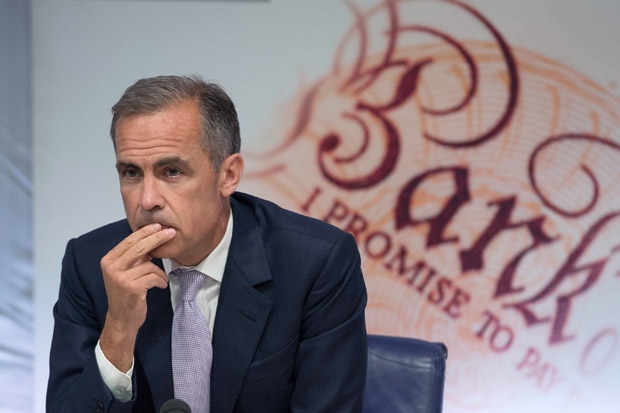Like the Christmas pudding sampled by Hercule Poirot at Kings Lacey — but six weeks early — our Spectator Money supplement contains a little treasure in every portion, and perhaps even a priceless gem. I particularly commend the essays by Warwick Lightfoot and Subitha Subramaniam on interest rates, and why central banks have become so hesitant to raise them. In recent days we’ve had an indication from Mark Carney of the Bank of England that UK rates will stay at their current low well into next year, maybe until 2017; in the US, strong job numbers have pumped expectations that the first rate rise for nine years will be delivered by Fed chairman Janet Yellen in December. But if she does so, the increase will most probably be wafer-thin, and as Lightfoot says, there are always likely to be external factors — such as worries about China — that will keep the pace of tightening timid for some time to come.
If US rates creep up but UK rates stand still, the pound will fall against the dollar, temporarily boosting exports, but pressure on Carney to fall into line will rise. As Subramaniam writes, this enigmatic governor has confused markets with contradictory messages: ‘In a world of increasing uncertainty, his lack of vision is unnerving.’ In a decade’s time, when the Poirots of punditry summon the suspects into the drawing room to establish who was responsible for the crash that followed the recovery, there may be a China-man hiding behind the curtain; but the central bankers who hesitated too long will be lined up on the sofa looking guilty.
The game goes on
Money-broking, when I saw it in action a generation ago, was an unsophisticated City game. It was mostly about matching banks with surplus dollar deposits to smaller banks that needed three- or six-month funding to make Eurodollar loans to state borrowers in Latin America and elsewhere. The mechanisms were simple, no one worried about counterparty risk, and the brokers were Essex blokes who courted junior bankers like me by taking us to a basement restaurant in Basinghall Street presided over by a near-topless dame called Big Val.
But there were some clever people in the market. The up-and-comer was Michael Spencer, who went on to build Icap, the world’s largest ‘interdealer broker’ and the source of the £700 million fortune with which he helps sustain the Conservative party. The old fox (now retired) was Derek Tullett, whose firm Tullett & Riley became part of Terry Smith’s Collins Stewart group in 2003 and whose name survives at Tullett Prebon, Icap’s biggest rival. The big City story this week is the sale of Icap’s voice-broking (old-fashioned phone-based) business to Tullett Prebon for around £1 billion.
Behind this consolidation is the post-crash shrinkage of the interbank market combined with the complexity of 21st–century finance: now everyone’s terrified of counter-party risk, regulators are all over it, and the clever stuff is done by computers. Tullett Prebon can achieve economies of scale as the dominant player in what’s left of voice-broking, while Icap — whose remaining activities are chiefly in electronic broking — repositions itself as a fashionable ‘fintech’ (financial technology) brand whose shares should command a higher market rating and might attract takeover interest. Fings ain’t what they used to be, but the game goes on.
Mixed postbag
Contrasting responses to my call for your experiences of opening bank accounts for start-ups. There were black marks for Coutts (‘Horrendous: the form-filling was beyond the pale, the jargon impenetrable’) and Metro Bank (‘Supposed to be the most welcoming… but I’ve spent two weeks completing the forms and dealing with questions about my identity… still can’t invoice my first client’). On the positive side, there were bouquets for Santander (‘An unsecured overdraft of £10,000 against my personal guarantee and nothing else’) and Yorkshire Bank (‘Hassle-free, friendly, efficient… the Yorkshire lass on the phone was extra-ordinarily pleasant’). An 85-year-old reader emails to say she has no plans to start a business but if she did she wouldn’t use HSBC online, which she finds ‘incomprehensible and generally life-shortening’. More stories please, to martin@spectator.co.uk.
Novelty shock
There was also an interesting follow-on to my item about ‘blockchains’, those online databases behind cryptocurrencies such as bitcoin that suddenly seem to be moving into the ‘fintech’ mainstream. In comes news that Seedrs, a leader of the UK’s fast-growing equity crowdfunding scene, is offering private investors a chance to ‘gain exposure to this fast-moving disruptive technology space’ via an initial public offering of shares in Consilium — a venture capital firm that has built ‘a portfolio of interests in 11 blockchain fintech-related companies’. Overall investment in the blockchain-and- bitcoin biz is forecast to hit $786 million in 2015, by the way, more than double the figure for 2014; a bandwagon is rolling.
I do hope this concatenation of baffling novelty doesn’t feel too life-shortening to read; let me reassure my elderly reader that writing about it diminishes, just a little, my own will to live. Daily we’re bombarded with glimpses of alternative futures (‘Royal Mail to pilot drone deliveries in rural areas’ was another of this week’s revelations, matching Spectator Money’s cover story about the advent of ‘robot’ investment advisers) but we can never tell which will be the new normal. Old-timer that I seem to have become, I’m reminded of a 1960s Bob Newhart sketch — you can find it on another novelty, YouTube — about Sir Walter Raleigh bringing tobacco back from the New World and trying to explain it: ‘Then whaddaya do after you roll it up, Walt? Don’t tell me, you stick it in your ear! No? Between your lips? And you SET FIRE TO IT!? Walt, you gotta be kidding me!’







Comments